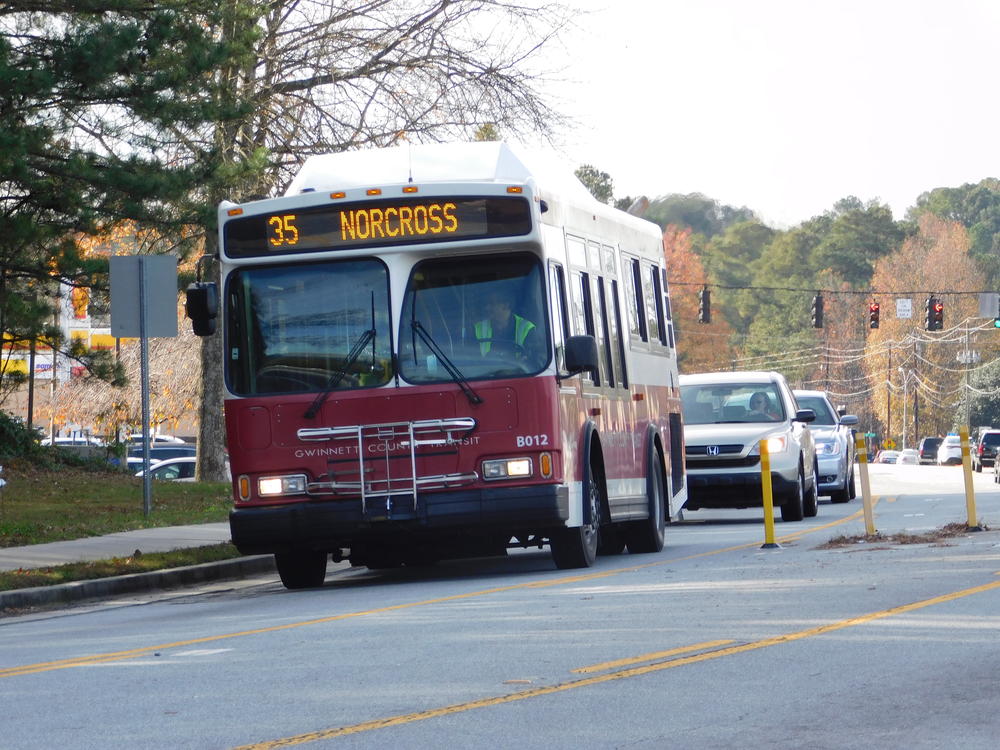
Caption
Gwinnett County public transit officials want to overhaul their public transit system. Their plans include bus rapid transit, ride share and an airport shuttle.
Credit: CC BY SA 4.0 / Wikimedia Commons

Gwinnett County public transit officials want to overhaul their public transit system. Their plans include bus rapid transit, ride share and an airport shuttle.
Metro Atlanta’s Gwinnett County has unveiled a $17 billion plan to transform its public transit system. The proposal leans heavily on a few nationwide trends.
Officials want to improve connections between Gwinnett County and Atlanta, including to Atlanta’s MARTA system and Hartsfield-Jackson International Airport.
But China Thomas, overseeing the project, said the plan’s core is a ride-sharing system, similar to Lyft and Uber.
“We are really looking to cover the entire county with the share-a-ride system and for it to be paired with a rapid ride similar to a BRT,” she said.
BRT stands for Bus Rapid Transit, which basically means buses with their own travel lanes and signal controls.
Both public transit ride-sharing and BRT are expanding nationwide because they’re seen as cost-effective options to improve public transit.
But whether and how Gwinnett County will raise the plan’s $17 billion price tag is still undecided.
Savannah’s Chatham Area Transit became the latest Georgia public transit system to experiment with ride-sharing earlier this year.
In April, the agency announced that it would use a $1.2 million federal grant to develop an electric vehicle on-demand service.
“It’s going to be integrated into the master plan to support CAT’s mission,” said Deborah Lam of Georgia Tech’s Smart Cities and Inclusive Innovation. “This is going to be a novel and innovative blueprint for the future of transit.”
However, CAT didn’t provide details on when the program would be launched.
In Atlanta, Georgia Tech partnered with MARTA on a similar pilot project in 2022.
Thomas also pointed to Gainesville’s ride-sharing program, which operates 22 on-demand passenger vans, as a possible model for Gwinnett County, which began a more limited ride-sharing pilot program in Lawrenceville and Snellville last month.
“I’m excited to see that kick off,” Gwinnett County Commissioner Matthew Holtkamp said. “And now we can actually start getting feedback from residents on how it’s working.”
Ride-sharing, also called micro-transit, is seen as a cost-effective supplement to fixed-route bus service because of bus maintenance and other costs.
Gwinnett’s proposed BRT route would connect its transit hub in Lawrenceville to Doraville, where one of MARTA’s rail lines ends, with three stops in between.
MARTA itself is investing heavily in BRT.
The agency broke ground in June on its 5-mile Summerhill/Capitol Avenue bus line that will feature off-board fare collection, real-time service information and level boarding along with other amenities more associated with rail stations.
“This line will provide an efficient connection between historic city neighborhoods, job centers, Georgia State and our rail system,” MARTA General Manager and CEO Collie Greenwood said. “It will be the benchmark for future BRT lines in metro Atlanta.”
Cities including Los Angeles, Cleveland and Indianapolis have rolled out popular BRT routes.
Public transit planners see them as providing many of the benefits of rail without rail’s cost.
Gwinnett County’s public transit overhaul would depend on county officials finding a way to pay for it. And so far, they haven’t.
“To get to the $17 billion, there would have to be an alternative funding source, which has not been established,” Thomas said.
However, county officials are floating an idea that they’ve tried before: a penny sales tax referendum that would ask voters to increase their sales taxes to fund the expansion.
County voters rejected such ballot questions in 2019 and 2020.
But back then, voting “yes” meant extending MARTA’s rail line to Norcross and turning the county’s transit system over to MARTA, among other proposals.
This time, the county’s public transit system would remain separate and the only connection to MARTA would be the BRT.
Whether county officials believe that change, and the plan overall, are enough to win over skeptical voters will play out over the next year as commissioners decide whether to place the proposal on the November 2024 ballot.
“I don’t think it’s fair to ask our constituents for such long-term approval without proving that we can pull off micro-transit successfully,” said Holtkamp, who hasn’t yet tried the Lawrenceville and Snellville ride-sharing pilot.
He represents an area of the county that isn’t included in the demonstration.
But he has heard from people who have used it to get around quickly and efficiently.
“Those kinds of stories are actually going to build a lot of goodwill with the community,” he said. “And then you’ll be able to ask them for this referendum on the big plan.”
Commissioners are expected to vote this week to send the overhaul proposal to The ATL, also known as the Atlanta Region Transit Link Authority, which oversees transit planning in a 13-county region, for its review.
The step is being described as a formality, with more consequential votes coming early in 2024.